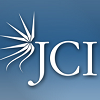RB1 deficiency in triple-negative breast cancer induces mitochondrial protein translation
Jone RA, etc
JCI,
2016
Triple-negative breast cancer (TNBC) includes basal-like and claudin-low subtypes for which no specific treatment is currently available. Although the retinoblastoma tumor-suppressor gene (RB1) is frequently lost together with TP53 in TNBC, it is not directly targetable. There is thus great interest in identifying vulnerabilities downstream of RB1 that can be therapeutically exploited. Here, we determined that combined inactivation of murine Rb and p53 in diverse mammary epithelial cells induced claudin-low–like TNBC with Met, Birc2/3-Mmp13-Yap1, and Pvt1-Myc amplifications. Gene set enrichment analysis revealed that Rb/p53-deficient tumors showed elevated expression of the mitochondrial protein translation (MPT) gene pathway relative to tumors harboring p53 deletion alone. Accordingly, bioinformatic, functional, and biochemical analyses showed that RB1-E2F complexes bind to MPT gene promoters to regulate transcription and control MPT. Additionally, a screen of US Food and Drug Administration–approved (FDA-approved) drugs identified the MPT antagonist tigecycline (TIG) as a potent inhibitor of Rb/p53-deficient tumor cell proliferation. TIG preferentially suppressed RB1-deficient TNBC cell proliferation, targeted both the bulk and cancer stem cell fraction, and strongly attenuated xenograft growth. It also cooperated with sulfasalazine, an FDA-approved inhibitor of cystine xCT antiporter, in culture and xenograft assays. Our results suggest that RB1 deficiency promotes cancer cell proliferation in part by enhancing mitochondrial function and identify TIG as a clinically approved drug for RB1-deficient TNBC.
- Journal
- JCI
- Year
- 2016
- Page
- doi: 10.1172/JCI81568
- Institute
- University Health Network
Referenced Products
| Product | Cat No. |
|---|---|
| Ad-Cre-IRES-GFP | 1710 |
| Ad-IRES-GFP | 1761 |
Vector Biolabs
293 Great Valley Parkway
Malvern, PA 19355
Email: info@vectorbiolabs.com
Phone: +1 484-325-5100
Toll-free (US Only): 877-BIO-LABS
Fax: +1 215-525-1112
Privacy Policy

